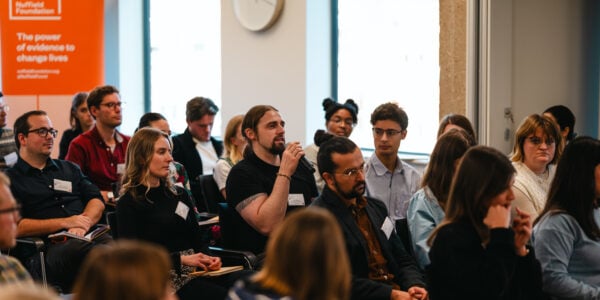In 2020 we made our highest ever commitment to charitable spending at £21.6 million, in support of our mission to advance social well-being. In addition to our planned activity, we responded across the Foundation to the COVID-19 pandemic.
2020 highlights
- At £21.6 million, our charitable spending was 6% higher than in 2019. This included £2.3 million for new projects to explore the social and economic impacts of the pandemic and £0.5m for projects already underway to undertake additional work in response to the crisis.
- Our investment strategy delivered strong annual growth of 12.3%, ahead of our performance benchmark and broadly in line with or ahead of most of our peer organisations. At the end of the year, the value of our investment portfolio was £466.1 million, a record high. This means we can continue to increase our charitable expenditure, in line with our goal to commit £100 million over the course of our five-year strategy.
- £1.8 million for the first major grant commitment from our Strategic Fund for The Economy 2030 Inquiry, a collaboration between the Resolution Foundation and the Centre for Economic Performance at the LSE. The Inquiry is exploring three major changes facing the UK economy – Brexit, COVID-19 and the transition to a zero-carbon future.
- Our flagship oral language programme, the Nuffield Early Language Intervention (NELI) is forming a key part of the early years catch-up package for schools, backed by a £9 million investment from the DfE.
- The first evidence review from our Changing face of early childhood series, drew on over 130 sources to address key questions about the changing nature of family life and what that means for the experience of young children in the UK today. The project lead, Carey Oppenheim was invited to give evidence to an Educational Select Committee Inquiry.
- We developed an online version of Nuffield Research Placements – Nuffield Future Researchers – to enable students from disadvantaged backgrounds to work on STEM projects in their summer holidays.
- The IFS Deaton Review of Inequalities provided valuable evidence of the disproportionate impact of the pandemic on people from some minority ethnic backgrounds. Its analysis of how the impact varies in different areas of the UK highlighted areas particularly vulnerable to the health and economic effects of the pandemic and the implications for policy.
- The UCL COVID-19 Social Study has surveyed over 70,000 people to track the social, economic and psychological impacts of the pandemic in real time. The lead researcher, Dr Daisy Fancourt, has been regularly briefing the Cabinet Office, the World Health Organisation (WHO), NHS England and Public Health England.
- The Food Foundation was influential in the success of Marcus Rashford’s Child Food Poverty Taskforce’s #EndChildPoverty campaign to extend the holiday activity and food programme and increase the value of Healthy Start vouchers.
- In January 2020, the Nuffield Council on Bioethics reported findings of its inquiry on the ethical issues of research in global health emergencies, which presciently informed its advice to government and other agencies on the handling of COVID-19. The Council’s work was referenced in WHO guidance on the ethical conduct of COVID-19 research and the Council’s Director, Hugh Whittall, gave evidence to a House of Lords Science and Technology Committee’s inquiry.
- The Ada Lovelace Institute undertook a rapid research review and public deliberation on the ethics and efficacy of contact tracing, vaccine passports and symptom trackers. The research was referenced by the Biometrics Commissioner, the Information Commissioner’s Office and in evidence submitted to the House of Commons Science and Technology Committee by Darren Jones MP.
- The Nuffield Family Justice Observatory was asked by Sir Andrew McFarlane, President of the Family Division to undertake two rapid consultations on the use of remote hearings in the family court. The consultations, based on the experiences shared by more than 2,300 parents, relatives and professionals, informed Sir Andrew’s subsequent framework document, which set out the road ahead for the family justice system.
During this difficult year, our priorities have been to support our staff, our grant-holders and the young people who participate in our student programmes, as well as to fund research that addresses the wider social significance of the pandemic.”Sir Keith Burnett, Chair of the Nuffield Foundation
How we spent it
- £11.3 million expenditure on research, development and analysis projects including £2.3 million for research on the social impacts of the COVID-19 pandemic and £5.7 million for other projects across our core domains of Education, Welfare and Justice.
- £3.6 million to STEM Learning to fund Nuffield Research Placements over a three-year period.
- £3.6 million on running the Ada Lovelace Institute, Nuffield Family Justice Observatory and the Nuffield Council on Bioethics – independent bodies we have established to examine areas central to our research agenda.
- At the end of 2020, we were managing 185 research, development and analysis projects with a total value of £40.9 million.
Looking ahead
- Many of our COVID-19 projects are ongoing and we will continue our synthesis and engagement activity through our online briefings and a series of roundtables. We will continue to fund research on the social and economic impacts of the pandemic through our Research, Development and Analysis Fund.
- Our Changing face of early childhood series will continue to be a priority. In March 2021, we published the second review in the series, Protecting children at risk of abuse and neglect.
- Through our Understanding Communities collaboration with the British Academy we are working with policy makers, researchers and practitioners to identify practical proposals for action to help those experiencing the greatest vulnerability and disadvantage in the UK.
- We have awarded £4.3 million from our Strategic Fund to two ambitious research programmes to help shape the future of work and skills. The NFER is leading the skills imperative 2035, a strategic research partnership which will identify the essential employment skills people will need for work by 2035. The Institute for the Future of Work (IFOW)’s Pissarides Review will examine the impacts of technological disruption on people and communities across the country.
The pandemic has not changed the Foundation’s strategic direction, but it has channelled it. We believe there is a window of opportunity to frame the evidence and arguments that will determine UK social policy over a decade that will be overshadowed by the pandemic’s consequences.”Tim Gardam, Chief Executive of the Nuffield Foundation
Our 2020 annual report presents the work we have undertaken towards achieving our strategic goals and publishes our accounts for the year.

















































